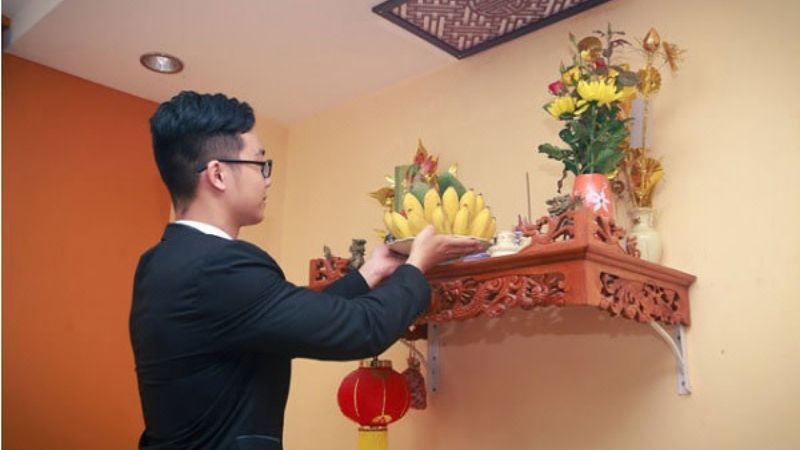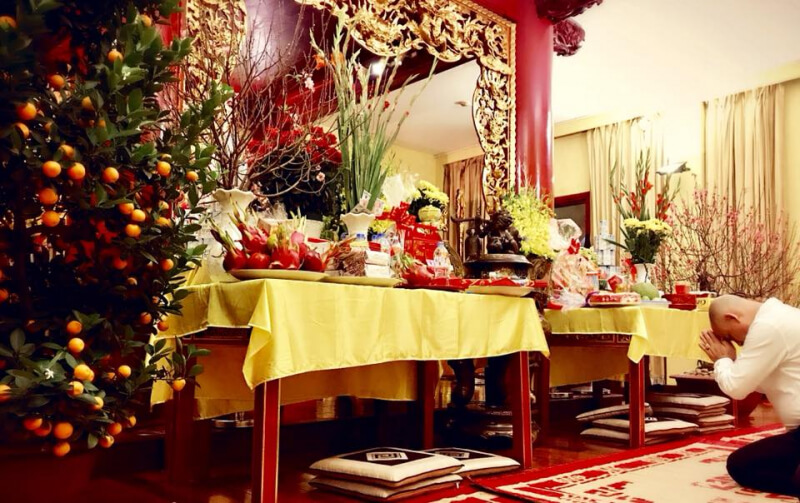In Vietnamese culture, the worship of the Kitchen God, or Tao Quan, is deeply rooted in the belief in a deity who oversees and protects the family’s kitchen and hearth. This tradition stems from an ancient desire to keep the hearth burning warmly, symbolizing familial harmony and a smooth sailing life filled with prosperity. It is considered auspicious for any family, whether moving into a new house or relocating, to set up sacred altars with dedication, including the ancestral altar and the Kitchen God altar with care.
1 How to Set Up a Kitchen God Altar for a Housewarming Ceremony
For your convenience and further guidance: How to Set Up a Kitchen God Altar for Good Feng Shui and Abundant Prosperity
 A Comprehensive Guide to Setting Up a Kitchen God Altar for a Housewarming Ceremony
A Comprehensive Guide to Setting Up a Kitchen God Altar for a Housewarming Ceremony
2 Offerings to Invite the Kitchen God to Your New Home
 Synchronize the time of worship with the housewarming ceremony for amplified blessings.
Synchronize the time of worship with the housewarming ceremony for amplified blessings.
Timely Tips for Worshipping the Kitchen God: This ritual is ideally performed simultaneously with your housewarming ceremony. It is a way to introduce your new home to the deities and seek their blessings from the very beginning of your stay.
What the homeowner should prepare with devotion:
- Incense, fresh flowers, fruits, and a carefully curated tray of savory dishes to please the senses of the deities and ancestors.
- Three sets of clothing and hats, two male and one female, along with joss paper, and gold and silver ingots. After the ceremony, these will be burned as a symbolic offering, releasing your prayers to the heavens.
3 A Prayer to Invite the Kitchen God to Your New Home
Nam mo a di da Phat / Nam mo a di da Phat / Nam mo a di da Phat! (Homage to the revered Amitabha Buddha)
With humble hearts, we bow before the Nine Heavens, the Ten Directions’ Buddhas, and the deities who preside over them. We offer our respects to the Emperor of Heaven, the Empress of Earth, the Kitchen God, and the local deities who lovingly watch over this area and its inhabitants.
We, the faithful homeowners, are: … (name of the homeowner/s)
Today, on this blessed … day of the … month of the … year, we come before the altar with sincerity. We offer incense, flowers, betel, and areca nuts, symbols of our devotion and respect. Before the deities’ majestic throne, we humbly share our intentions:
Oh, wise and righteous deities, who hold dominion over the Three Palaces, control creation, and embody filial piety and benevolence. You who protect the people, guard their spirits, and uphold righteousness, hear our prayer.
Our family has completed the construction of our new home and has chosen this auspicious day to move in. We humbly request your permission to inhabit this address: (new address). We wish to establish an incense pot as a symbol of our devotion and to worship you with reverence.
We also seek your blessing to invite the spirits of our ancestors to reside here so that we may continue our devotion to them. Bestow upon us your grace and protection, bringing peace and good fortune to our family in all our endeavors.
We further invite the local wandering spirits and lonely souls without refuge in this area to come and share in our offerings. We express our sincere gratitude for the protection granted during the construction of our home, ensuring a smooth and safe process. May you continue to bless our family with harmony and abundance.
We offer this ritual with sincerity and pray for your continued protection and blessings. Respectfully, we announce our devotion!
Nam mo a di da Phat / Nam mo a di da Phat / Nam mo a di da Phat! (Once more, our homage to Amitabha Buddha)
Following this prayer, the homeowner can burn the gold and silver ingots and confidently settle into their new home. However, it is essential to remember to diligently prepare offerings on full moon days and holidays to honor the ancestors. This ensures their continued blessings for a life filled with happiness and good fortune.
For your reference and peace of mind: The Correct and Standard Prayer for the Kitchen God in the Year 2024
4 The Proper Way to Invite the Kitchen God to Your New Abode
The sacred ritual for worshipping the Kitchen God will take place within the heart of the home – the kitchen.
When setting up the Kitchen God altar, choose a dry area, away from water sources, to ensure the longevity of the offerings and the comfort of the deities. Follow these steps with reverence to set up the altar and perform the worship ritual:
Note: It is generally advisable for the homeowner to perform the ritual of inviting the Kitchen God into the new house. This personal touch adds to the sincerity of the ceremony.
 A Guide to Worshipping the Kitchen God in Your New Home with Reverence
A Guide to Worshipping the Kitchen God in Your New Home with Reverence
5 Notes on the Placement of the Kitchen God Altar within the Kitchen
– Position the Kitchen God altar inside the kitchen, facing the direction of the stove, and keep it parallel to maintain a harmonious relationship with the cooking area. Avoid placing it too far from the stove, as this may create a sense of distance from the deities during daily rituals.
– Refrain from placing a smoke exhaust fan next to the altar, as this may disrupt the peaceful atmosphere and disperse the incense smoke, which carries your prayers.
– Consider installing a shelf above the stove to keep the altar away from the direct heat and activities of cooking, ensuring a clean and respectful environment.
– According to the principles of feng shui, avoid placing the altar next to the sink, as this may lead to disharmony and frequent arguments within the family. Water and fire are opposing elements, and their close proximity may create an imbalance.
– Do not place the altar facing or next to the toilet, as this is considered a place of filth and is not suitable for the sacred space you wish to create.
– If your kitchen is on the smaller side, place the altar in the southern corner adjacent to the kitchen. As the Kitchen God is associated with fire in the five elements theory, placing the altar in the south, which represents “fire,” is considered auspicious and may bring good fortune.
– If circumstances do not allow for a separate altar for the Kitchen God, it is advisable to light incense and candles at the ancestors’ altar instead. This ensures that your devotion reaches the deities, even if the traditional setup is not possible.
We hope that this guide has provided you with valuable insights into the ritual of inviting the Kitchen God into your new home. Remember to perform the ritual correctly and in accordance with feng shui principles to bring warmth, harmony, and abundance into your living space.
The Ultimate Guide to the Traditional Vietnamese Fruit Tray for Housewarming Ceremonies
The traditional ceremony of housewarming and groundbreaking calls for a special offering – a tray of five types of fruits, carefully selected to represent the five elements of nature. This symbolic gesture is believed to bring good fortune and blessings from the Earth deity, ensuring a smooth construction process and future prosperity for the new home. Today, we delve into the art of crafting this auspicious fruit tray, offering a comprehensive guide to help you create a truly meaningful and complete offering.
































